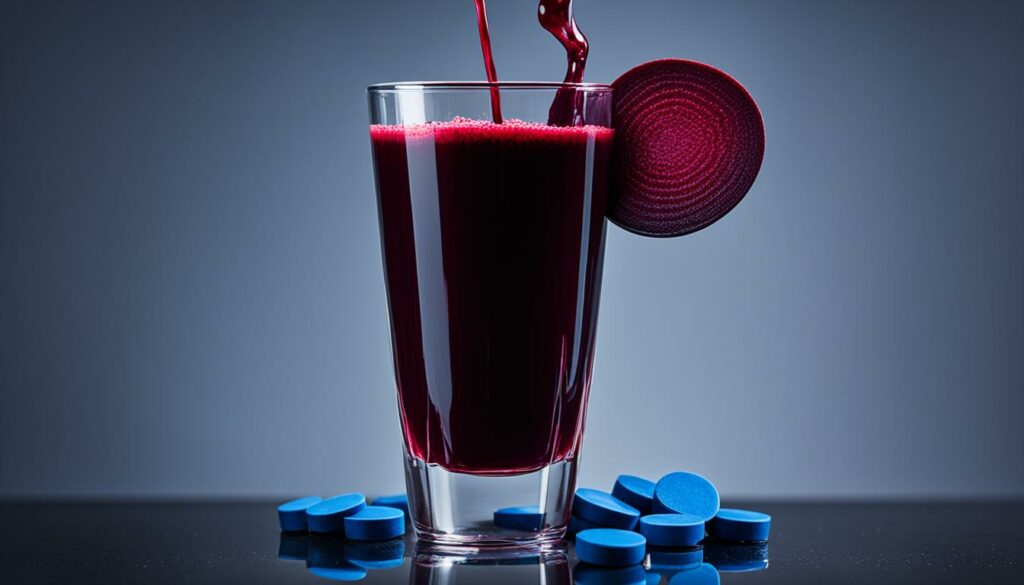Did you know that beetroot, a common vegetable found in many households, has potential benefits for sexual health and vitality?
While it may sound surprising, beetroot is believed to have natural libido-enhancing properties and is hailed as an aphrodisiac by some individuals.
Although there is no scientific evidence to support these claims, beetroot does contain compounds that could positively impact sexual performance and overall sexual health.
Beetroot is rich in nitrates, which the body converts into nitric oxide. Nitric oxide plays a crucial role in relaxing and expanding blood vessels, improving blood flow throughout the body.
This increased blood flow can potentially aid in erectile dysfunction (ED) by promoting better circulation to the genitals. Furthermore, beetroot may help lower blood pressure, which is linked to ED.
While these benefits are mostly anecdotal, many individuals swear by the positive effects of incorporating beetroot into their diet for enhanced sexual vitality.
Key Takeaways
- Beetroot is believed to have aphrodisiac properties and is considered a natural libido enhancer.
- While there is no scientific evidence, beetroot contains compounds that can positively impact sexual performance and overall sexual health.
- Nitrates in beetroot are converted into nitric oxide, which helps relax and expand blood vessels, potentially aiding in erectile dysfunction.
- Beetroot’s ability to lower blood pressure may help improve sexual function, as high blood pressure is a contributing factor to ED.
- It’s important to note that beetroot should be consumed in moderation, and individuals with certain conditions or taking medications should consult with a doctor before adding it to their diet.
Beetroot and Erectile Dysfunction – Is There Scientific Evidence?
While many individuals claim that beets can help with erectile dysfunction (ED), there is currently no scientific evidence to support this claim.
The research on beetroot and ED is limited, and there are no scientific studies specifically investigating its effectiveness for ED.
However, beetroot is high in nitrates, which the body converts into nitric oxide. Nitric oxide helps relax and expand blood vessels, potentially improving blood flow to the penis and aiding in ED.
Some studies have shown that beetroot can lower blood pressure, which may be beneficial for individuals with high blood pressure-related ED.
Overall, while the evidence is anecdotal, beetroot may have potential benefits for ED, but more research is needed to confirm its effectiveness.

The Role of Nitric Oxide in Sexual Health
Nitric oxide plays a significant role in sexual health, particularly in erectile function. Nitric oxide helps relax and expand blood vessels, allowing for increased blood flow to the penis.
This increased blood flow is essential for achieving and maintaining an erection.
Many individuals with erectile dysfunction (ED) are prescribed medications that increase nitric oxide levels in the body to improve blood flow to the penis and aid in achieving an erection.
Beet juice is high in nitrates, which the body converts into nitric oxide. Therefore, beet juice may indirectly contribute to sexual health by promoting the production of nitric oxide and improving blood flow.
However, more research is needed to fully understand the role of nitric oxide in sexual health and the specific benefits of beet juice. While anecdotal evidence suggests that beet juice may have positive effects on sexual health, including enhancing erectile function and libido, further scientific studies are required to confirm these claims.
“The potential role of nitric oxide in sexual health is an area of ongoing research. While some evidence supports the link between nitric oxide and improved blood flow to the penis, more studies are needed to establish the specific benefits of beet juice and its impact on sexual function.”
In the meantime, individuals interested in promoting sexual health can consider incorporating beetroot into their diet as part of a balanced and healthy lifestyle.
However, it’s important to note that beetroot is not a substitute for medical treatment for underlying sexual health conditions. It’s always advisable to consult with a healthcare professional for personalized advice and guidance.
Nitric Oxide-Boosting Foods
| Food | Nitric Oxide-Boosting Properties |
|---|---|
| Beetroot | High in nitrates, which convert to nitric oxide in the body |
| Garlic | Contains compounds that stimulate nitric oxide production |
| Pomegranate | Rich in antioxidants that support healthy blood vessel function |
| Spinach | A good source of nitrates and folate, which promote nitric oxide production |
| Watermelon | Contains an amino acid called citrulline, which increases nitric oxide production |

Health Benefits of Beets
Beetroot offers a wide range of health benefits that go beyond its potential impact on sexual health.
This vibrant root vegetable is packed with essential vitamins and minerals, making it a nutritious addition to your diet. Here are some of the key health benefits of beetroot:
- Rich in Nutrients: Beets are a great source of iron, potassium, and manganese, which are essential for various bodily functions. These nutrients play a vital role in maintaining overall health and well-being.
- Promotes Heart Health: The nitrates found in beetroot help improve blood flow and lower blood pressure. By enhancing the dilation of blood vessels, beetroot may contribute to a healthier cardiovascular system.
- Aids Digestion: Beets are rich in fiber, which supports healthy digestion and promotes regular bowel movements. Consuming beetroot can help alleviate constipation and keep your digestive system functioning optimally.
- Boosts Immune System: The antioxidants present in beetroot help strengthen your immune system, protecting your body from harmful free radicals. This can help reduce the risk of chronic diseases and support overall immune function.
- May Fight Cancer: Some research suggests that beet juice may have potential anticancer properties. The high concentration of antioxidants and other compounds in beets may help inhibit the growth of cancer cells, although more studies are needed to confirm these findings.
Additionally, some individuals claim that drinking beet juice before exercise can enhance stamina and increase endurance.
While the evidence for this is limited, the nitrates in beet juice may improve oxygen delivery to muscles, potentially supporting physical performance.
Beetroot can be incorporated into your diet in various ways, such as juicing, blending, or adding it to salads. However, it’s essential to consume beetroot in moderation due to its high sugar content. Aim to include a balanced variety of fruits, vegetables, and other nutritious foods in your diet for optimal health benefits.
Risks and Precautions of Using Beetroot
While beetroot is generally safe for most individuals when consumed in moderation, there are some risks and precautions to consider:
Beeturia
One potential side effect of consuming beets is beeturia, a condition where the urine turns red or pink after eating beets. This is harmless and temporary.
Calcium Oxalate Kidney Stones
Individuals with a history of calcium oxalate kidney stones may want to limit their intake of beets due to their high oxalate content. This can help prevent the formation of new stones.
Lowered Blood Pressure
Beets are high in nitrates, which can lower blood pressure. Therefore, individuals taking medications or supplements for high blood pressure should exercise caution and consult with a healthcare professional before consuming beet juice.
Diabetes Management
Individuals with diabetes should be aware that beets are high in sugar and may affect blood sugar levels. It is essential to monitor blood sugar levels regularly and make any necessary insulin adjustments.
Consult with a Healthcare Professional
As with any dietary change, it is advised to consult with a doctor if you have any medical conditions or take medications that could be impacted by consuming beet juice. They can provide personalized advice and guidance based on your specific situation.
By being cautious and considering these risks and precautions, you can safely incorporate beet juice into your diet and enjoy its potential health benefits.
| Risks of Using Beetroot | Precautions for Consuming Beetroot |
|---|---|
| Beeturia: Urine may turn red or pink after consuming beets. | Individuals with a history of calcium oxalate kidney stones should limit their intake of beets. |
| Beets are high in nitrates, which can lower blood pressure. | Consult with a healthcare professional before consuming beetroot if you are taking medications or supplements for high blood pressure. |
| Beets are high in sugar and may affect blood sugar levels. | Monitor blood sugar levels regularly and make necessary insulin adjustments if you have diabetes. |
| Consult with a healthcare professional if you have any medical conditions or take medications that could be impacted by consuming beetroot. |
Conclusion
While the scientific evidence for the sexual benefits of beetroot is limited, many individuals believe that it can improve sexual health and function. beetroot is rich in nitrates, which the body converts into nitric oxide.
Nitric oxide helps relax blood vessels, leading to improved blood flow and potentially enhancing sexual performance and libido.
In addition to its potential sexual benefits, beetroot offers a range of other health benefits. It is a good source of essential vitamins and minerals, including iron, potassium, and manganese.
Beetroot also contains dietary fiber, which aids in digestion and promotes a feeling of fullness. Some studies suggest that beetroot may have anticancer properties, although further research is needed to confirm this.
It is important to consume beetroot in moderation and be aware of potential risks. Beeturia, a harmless condition where urine turns red or pink after eating beets, can occur in some individuals.
Beetroot may also lower blood pressure, so individuals taking medications or supplements for high blood pressure should consult with a healthcare professional before incorporating it into their diet. Likewise, individuals with diabetes should monitor their blood sugar levels due to the natural sugars present in beets.
While the scientific evidence may be limited, beetroot may be worth considering as part of a natural approach to promoting sexual vitality and overall health.
As with any dietary change or supplement, it is advisable to consult with a healthcare professional before making significant adjustments to your routine.
FAQ
Are there any scientific studies that support the claim that beetroot can help with erectile dysfunction (ED)?
Currently, there is no scientific evidence to support the claim that beetroot can help with ED. While beetroot contains compounds that may have potential benefits for sexual health, more research is needed to confirm its effectiveness.
What is the role of nitric oxide in sexual health?
Nitric oxide plays a significant role in sexual health, particularly in erectile function. It helps relax and expand blood vessels, allowing for increased blood flow to the penis and aiding in achieving and maintaining an erection.
What are the health benefits of beetroot?
In addition to its potential impact on sexual health, beetroot offers various other health benefits. It is a good source of essential vitamins and minerals, including iron, potassium, and manganese.
It provides fiber, aids in digestion, and may help lower cholesterol levels. Beetroot also contains potential anticancer properties, although more research is needed.
Are there any risks or precautions associated with consuming beetroot?
While beetroot is generally safe for most individuals when consumed in moderation, there are some risks and precautions to consider. Beeturia, a condition where the urine turns red or pink after eating beets, may occur.
Individuals with a history of calcium oxalate kidney stones should limit their intake of beets due to their high oxalate content. Additionally, beetroot is high in nitrates, which can lower blood pressure.
Individuals taking medications or supplements for high blood pressure should exercise caution and consult with a healthcare professional. Individuals with diabetes should also monitor their blood sugar levels, as beets are high in sugar.
Can beetroot enhance sexual vitality and overall health?
While the evidence is anecdotal, beetroot may have potential benefits for sexual health and overall health. It contains compounds that promote nitric oxide production and improve blood flow, which can indirectly contribute to enhanced sexual performance and libido.
Additionally, beetroot offers various nutritional benefits. However, it’s important to consume beetroot in moderation and consult with a healthcare professional before making any significant dietary changes.




